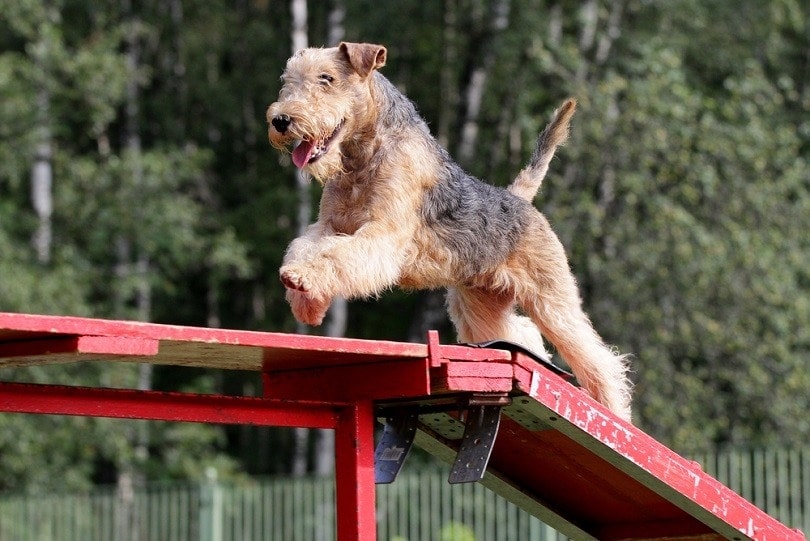Why Do Dogs Lay on Your Feet? 4 Common Reasons for This Behavior
By Oliver Jones
Updated on

Have you ever been sitting on the couch reading a book or watching television when your canine companion suddenly curls up and lays down on your feet? While your dog’s body may keep your tootsies warm and cozy, this behavior can be annoying for some pet parents.
Is your dog being needy? Are they scared? Is this submissive behavior? Here, we’ll discuss all of the reasons why your dog lays on your feet and some ways to correct this habit.
Why Do Dogs Lay at Your Feet? The 4 Likely Reasons
1. Natural Dog Instincts

Your pooch’s wild ancestors were pack animals. Your domesticated dog, even a 7-pound Toy Poodle who has never spent a day in the woods, still possesses some innate pack traits.
Wild canines will often stop to rest after a long day of roaming or hunting. This resting spot will be chosen by the alpha, or leader, of the pack. The other dogs will huddle around for warmth and safety.
When your dog lays on your feet, they’re showing you that they think you’re the leader. They feel comfortable and protected in your presence.
2. Territorial Dog
If you live in a multi-dog household, one of your pups may lay on your feet to lay their claim over you. This is their way of telling the other dogs that you’re their leader and that they need to stay far away.
If your dog doesn’t display any signs of aggression, this can be acceptable behavior. However, if the possessiveness is accompanied by growling, you may need to seek the help of a qualified trainer.
3. Dog Displaying Dominance

Has your small dog ever hopped up onto your lap? Have they perched on your feet? While you may believe that your pint-sized pooch is simply looking to cuddle, they may actually be trying to tell you that they’re the boss and you’re their property.
By sitting on either your lap or your feet, your little dog will feel larger and more in charge.
4. Dog Protecting the Pack
Does your dog lay on your feet when you have friends or family over? They may be protecting you from unwanted outsiders. By laying on your feet, your pet is putting themself between you and any potential threats.
If your dog’s protective ways are leading to acts of aggression, contact a dog trainer right away. Your dog could potentially nip or bite somebody.
Stopping the Behavior
If your dog’s habit of laying on your feet is becoming a nuisance, there are several ways to put an end to the behavior. For starters, never encourage or reward your pet for this behavior. Never pet or cuddle them when they’re lying on your feet. If you reward them, you’ll show your dog that this behavior is perfectly acceptable.
Whenever your pup tries to curl up on your feet, immediately move your feet out from under them. Ignore them until they move away.
You can also train your dog to sleep in an area far away from you. Put their dog bed on the opposite of the room and give them a high-value treat every time they lay on it. This will teach them to start associating their bed with a reward.
If your dog’s foot laying is accompanied by aggression, contact a qualified dog trainer. This will ensure you’re not putting yourself, your pet, or other people in harm’s way.
Conclusion
While some pet parents may welcome the behavior, others may not appreciate their dog laying on their feet. Whether your pooch is displaying their devotion or trying to show dominance, you can stop the behavior by ignoring it. If your dog growls when they’re lying on your feet, seek professional help as soon as possible.
Related Reads:
Featured image credit: AnnyStudio, Shutterstock













